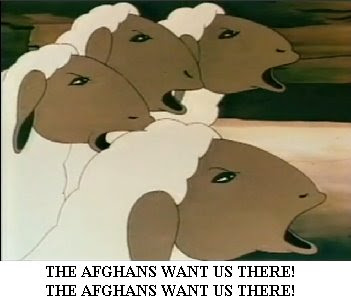Most readers will recall from junior high school the chanting sheep from George Orwell’s Animal Farm. At the climax of the book, when the ruling pigs have taken on all the traits of the human bosses who ruled before them, the sheep block out all criticism of the new ruling class with their chant: “Four legs good, two legs better!”
It is of course rather blunt symbolism, as is the book as a whole, but it is not without considerable merit in illuminating important tendencies not only in the oppressive Soviet system but in our own society as well.
‘If Comrade Napoleon says it, it must be right.’
Consider the oft-repeated claim that Afghans welcome the foreign occupation of their country. That is the assertion of such luminaries as Defense Minister Peter MacKay (‘The Afghans want us there. ‘), Canada’s ambassador to Afghanistan Arif Lalani (‘at the end of the day Afghans want us there’) as well as NATO official Christopher Alexander (‘ keep in mind that Afghans want us there’).

But how true is this statement? We’ll get to some polling results directly, but first a word on how to interpret poll findings.
It is striking to see the enthusiasm with which the mass media trumpet poll results that indicate support for the occupation among Afghans. It seems never to have occurred to pundits and editors that the presence of foreign occupiers might lead to biased public opinion polling. Among scholars who study public opinion, however, there are few such illusions. For them, polling responses which support foreign occupiers, foreign-imposed regimes or dictatorships are basically useless – which conforms with simple common sense, one might add. Instead, only those poll respondents who voice criticism or opposition to such violently imposed regimes are taken to be sincere.
While dissident opinion is considered authentic under conditions of coercion, it is commonly thought to be under-reported. That is, expressed opinion which opposes a foreign-imposed regime is but a fraction of actual opposition. Precisely what fraction it represents is of course not known.
In light of this, let us look at some relevant polling results from Afghanistan, courtesy of Anthony Cordesman. In a recent essay, Cordesman analyzes the results of a recent poll commissioned by the BBC and ABC and ARD (Germany).
Read More